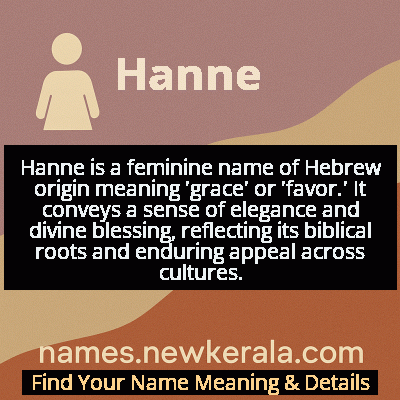Hanne Name Meaning & Details
Origin, Popularity, Numerology Analysis & Name Meaning of Hanne
Discover the origin, meaning, and cultural significance of the name HANNE. Delve into its historical roots and explore the lasting impact it has had on communities and traditions.
Name
Hanne
Gender
Female
Origin
Hebrew
Lucky Number
6
Meaning of the Name - Hanne
Hanne is a feminine name of Hebrew origin meaning 'grace' or 'favor.' It conveys a sense of elegance and divine blessing, reflecting its biblical roots and enduring appeal across cultures.
Hanne - Complete Numerology Analysis
Your Numerology Number
Based on Pythagorean Numerology System
Ruling Planet
Venus
Positive Nature
Harmonious, responsible, caring, and artistic.
Negative Traits
Overly idealistic, superficial, possessive, or jealous.
Lucky Colours
Pink, turquoise.
Lucky Days
Friday.
Lucky Stones
Diamond, turquoise.
Harmony Numbers
2, 3, 9.
Best Suited Professions
Artists, musicians, teachers, healthcare workers.
What People Like About You
Warmth, nurturing nature, artistic flair.
Famous People Named Hanne
Hanne Darboven
Conceptual Artist
German artist known for her large-scale installations featuring handwritten tables and numerical calculations
Hanne Hukkelberg
Musician
Norwegian singer-songwriter known for her experimental folk and jazz-influenced music
Hanne Gaby Odiele
Fashion Model
Belgian model known for her androgynous look and work with major fashion houses
Hanne Krogh
Singer
Norwegian singer who won the Eurovision Song Contest in 1985 as part of Bobbysocks
Name Variations & International Equivalents
Click on blue names to explore their detailed meanings. Gray names with will be available soon.
Cultural & Historical Significance
Throughout European history, particularly in German and Scandinavian cultures, Hanne became a popular diminutive and standalone name. It maintained its connection to grace and favor while adapting to local linguistic traditions. In Germanic regions, Hanne evolved as both a feminine form and sometimes as a masculine diminutive of Johannes, though its primary usage remains feminine. The name's enduring popularity across centuries reflects its timeless appeal and the universal appreciation for its meaning of grace and divine favor.
The name also holds cultural significance in modern Scandinavian societies, where it represents a connection to tradition while maintaining contemporary relevance. In countries like Norway and Denmark, Hanne is considered both classic and approachable, often associated with strong, independent women who balance traditional values with modern perspectives.
Extended Personality Analysis
Individuals named Hanne are often perceived as graceful, compassionate, and emotionally intelligent. They tend to possess a natural elegance in their demeanor and interactions, reflecting the name's meaning of 'grace.' Hanne's are typically thoughtful and considerate, with a strong ability to understand and empathize with others' feelings. Their grace extends beyond physical movement to include graciousness in relationships and social situations.
Hanne's often exhibit a quiet strength and resilience that may not be immediately apparent. They are frequently described as dependable and loyal friends who provide steady support during difficult times. While they may appear reserved initially, they possess deep emotional depth and intellectual curiosity. Many Hanne's demonstrate artistic or creative talents, and they approach challenges with a balanced perspective that combines practicality with intuition.
In professional settings, Hanne's are often valued for their diplomatic skills and ability to mediate conflicts. They tend to be meticulous and thorough in their work, with a strong sense of responsibility. Their combination of inner strength and outward grace makes them particularly effective in roles requiring emotional intelligence and interpersonal skills. Despite their gentle nature, they can be surprisingly determined when pursuing goals they believe in.
Modern Usage & Popularity
In contemporary times, Hanne remains particularly popular in Scandinavian countries, especially Norway and Denmark, where it ranks among the classic yet modern name choices. The name has maintained steady popularity in German-speaking regions as both a standalone name and a diminutive for Johanna. While less common in English-speaking countries, it appears occasionally as an elegant alternative to the more popular Hannah. Recent years have seen a resurgence of interest in shorter, classic names, which has benefited Hanne's popularity. The name appeals to parents seeking a name that is both traditional and distinctive, with international appeal yet cultural specificity to Northern European heritage. Social media and global connectivity have also contributed to Hanne's cross-cultural recognition, though it remains most strongly associated with Scandinavian and German naming traditions.
Symbolic & Spiritual Meanings
Symbolically, Hanne represents grace in its fullest sense – not merely physical elegance but spiritual grace, kindness, and the ability to move through life with dignity and compassion. The name carries connotations of divine favor and blessing, connecting the bearer to concepts of mercy and benevolence. In metaphorical terms, Hanne symbolizes the graceful navigation of life's challenges, the beauty of resilience, and the power of quiet strength. It suggests someone who brings harmony to their surroundings and possesses an innate ability to soothe and comfort others. The name also embodies the idea of answered prayers and the fulfillment of heartfelt desires, reflecting its biblical origins where Hannah's prayers were answered after years of longing. This symbolic meaning extends to represent hope, faith, and the belief that grace can transform difficult circumstances into opportunities for growth and blessing.

